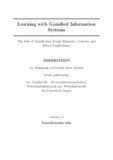Zitierlink:
http://dx.doi.org/10.25819/ubsi/10085Dateien zu dieser Ressource:
| Datei | Beschreibung | Größe | Format | |
|---|---|---|---|---|
| Dissertation_Katharina_Jahn.pdf | 7.88 MB | Adobe PDF |  Öffnen/Anzeigen |
| Dokumentart: | Doctoral Thesis | Titel: | Learning with gamified information systems | Titelzusatz: | the role of gamification design elements, contexts, and ethical implications | Sonstiger Titel: | Lernen mit gamifizierten Informationssystemen : die Rolle von Gamificationdesignelementen, Kontexten und ethischen Implikationen | AutorInn(en): | Jahn, Katharina | Institut: | Fakultät III - Wirtschaftswissenschaften, Wirtschaftsinformatik und Wirtschaftsrecht | Schlagwörter: | Virtual bodies, Acceptance, Individualization, Approach bias, Uncanny valley, Virtuelle Realität, Gamification, Roboter, Motivation, Lernen | DDC-Sachgruppe: | 330 Wirtschaft | GHBS-Notation: | QGT | Erscheinungsjahr: | 2022 | Publikationsjahr: | 2022 | Zusammenfassung: | Gamification is increasingly used in both private and work life domains. Whereas research on gamification has shown that gamification can have a positive impact on motivational and performance-related outcomes, some contradictory findings suggest that the specific design and implementation of gamification as well as the contexts in which gamification takes place play a crucial role for the specific effects on learning-related outcomes. Moreover, it is still unclear which specific gamification design elements are effective, how they can be combined, and how the implementation of specific gamification design elements might affect learning-related outcomes. Against this background, this thesis investigates the effects of gamification and the contexts in which gamification may take place using both quantitative and qualitative methods. The results show that individualized gamification design elements can positively affect motivational and performance-related outcomes. Additionally, the specific learning opportunities of the contexts in which gamification is implemented should be considered in the design of suitable gamification design elements. Gamification wird zunehmend sowohl im privaten als auch im beruflichen Bereich eingesetzt. Während die Forschung zu Gamification gezeigt hat, dass Gamification sich positiv auf motivations- und leistungsbezogene Ergebnisse auswirken kann, deuten einige widersprüchliche Ergebnisse darauf hin, dass die spezifische Gestaltung und Umsetzung von Gamification sowie die Kontexte, in denen Gamification stattfindet, eine entscheidende Rolle für die spezifischen Auswirkungen auf lernbezogene Ergebnisse spielen. Darüber hinaus ist nach wie vor unklar, welche spezifischen Gamificationdesignelemente wirksam sind, wie sie kombiniert werden können und wie sich die Implementierung spezifischer Gamificationdesignelemente auf die Lernergebnisse auswirken kann. Vor diesem Hintergrund werden in dieser Arbeit die Wirkungen von Gamification und die Kontexte, in denen Gamification stattfinden kann, mit quantitativen und qualitativen Methoden untersucht. Die Ergebnisse zeigen, dass sich individualisierte Gamificationdesignelemente positiv auf motivationale und leistungsbezogene Ergebnisse auswirken können. Darüber hinaus sollten die spezifischen Lernmöglichkeiten der Kontexte, in denen Gamification eingesetzt wird, bei der Gestaltung geeigneter Gamificationdesignelemente berücksichtigt werden. |
DOI: | http://dx.doi.org/10.25819/ubsi/10085 | URN: | urn:nbn:de:hbz:467-21733 | URI: | https://dspace.ub.uni-siegen.de/handle/ubsi/2173 |
| Enthalten in den Sammlungen: | Hochschulschriften |
Diese Ressource ist urheberrechtlich geschützt. |
Seitenansichten
679
checked on 25.11.2024
Download(s)
496
checked on 25.11.2024
Google ScholarTM
Prüfe
Prüfe
Alle Ressourcen in diesem Repository sind urheberrechtlich geschützt, soweit nicht anderweitig angezeigt.

